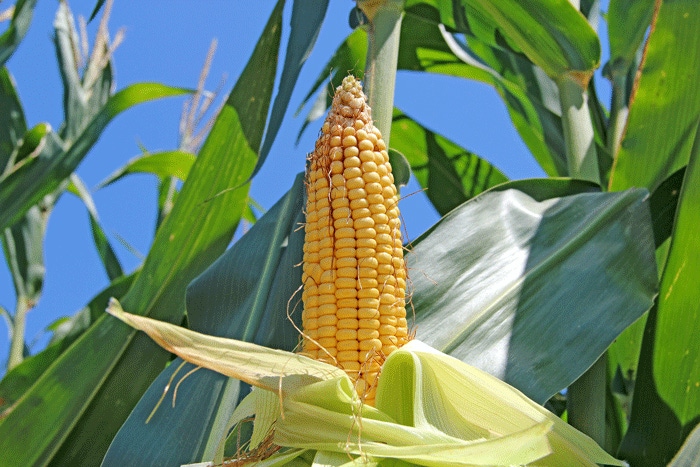
As a prolonged drought saps U.S. corn yields, a tug-of war over shrinking stocks has intensified between livestock/poultry producers and proponents of the government-mandated Renewable Fuel Standard (RFS).
While the ethanol industry says that corn and feed prices are minimally impacted by the RFS, cattlemen and poultry producers continue to claim just the opposite — a claim they have made for years.
With many livestock/poultry producers facing exploding feed costs, a coalition of their backers has asked the EPA for a RFS waiver to reduce market pressures. The petition, filed by the National Pork Producers Council on behalf of the coalition, requests that EPA administrator Lisa Jackson waive “in whole or in substantial part” the mandated quantity of ethanol in 2012 (13.2 billion gallons, requiring some 4.7 billion bushels of corn) and at least part of 2013 (13.8 billion gallons, requiring 4.9 billion bushels of corn).
Read the petition here.
“Some agricultural forecasters now are estimating that just 11.8 billion bushels of corn will be harvested this year — about 13 billion were harvested in 2011 — meaning corn-ethanol production will use about four of every 10 bushels,” said a coalition release.
Arkansas Gov. Mike Beebe is also “looking at” petitioning the EPA to waive the RFS “on a temporary basis,” said spokesman Matt DeCample. “On top of (the concerns of ethanol’s impact on feed prices), we have the extraordinary conditions of the drought we’re dealing with. The governor is considering asking for a temporary waiver of the ethanol requirements. We’ve not formally signed on yet with any grower or farmer groups or multi-state efforts.”
DeCample said Beebe’s decision on whether to proceed with the petition should come by mid-August.
During a Monday morning (July 30) conference call touting the waiver petition, J.D. Alexander, Nebraska cattleman and National Cattlemen’s Beef Association president, said members of the organization “do not stand for federal mandates picking winners and losers. We do not stand for manipulation of corn prices. We do not stand for our federal government sitting by patiently, forking over taxpayer dollars to artificially inflate the price of corn for livestock producers and other end-users.
“We also find it concerning to the viability of the livestock industry that these mandates are allowed to continue today in the worst drought I’ve seen in my lifetime. Seventy percent of cattle country is under drought conditions. This is not isolated to a certain part of the country.”
Minnesota turkey grower and National Turkey Federation vice-chairman John Burkel said he buys around 100,000 bushels of corn annually. “The price of corn plays a critical role in my ability to feed my family. The availability of corn this year is uncertain and I’ll have to make difficult decisions when it comes to purchasing my feed. I’ve already cancelled my last flock of turkeys for this year.
Almost impossible situation
“The reality is that with these (corn) prices, which have been distorted by the RFS mandate, even the most prudent and cautious producer can be put out of business. Things are now worse than in 2008 when high corn prices — and the refusal by EPA to see the economic harm coming — put turkey companies out of business.”
Chicken producers are also on an economic knife-edge said Michael Welch, President and CEO of Harrison Poultry in Bethlehem, Georgia. “One of the detrimental effects of the serious drought conditions across nearly two-thirds of the country is the fact that some analysts are predicting the U.S. (corn yield) this fall will be at least one-third smaller than the USDA’s first forecast. (This has) caused a 60 percent spike in corn prices since June. This means literally tens of billions of dollars in increased costs for livestock and poultry producers and food manufacturers.
“Chicken companies in particular are being severely impacted by the growing diversion of corn into government-mandated ethanol programs. … (As a result) six federally-inspected chicken companies in 2011 went out of business, filed for bankruptcy or were forced to be acquired by other companies, some foreign-owned. Thousands of jobs were lost, hundreds of farmers weren’t able to continue to grow chickens. A repeat scenario could be experienced in 2013.
“When Congress enacted the expanded RFS in 2007, certain safety valves for the RFS were put in place. One provision allows the administrator of the EPA to reduce the required volume of renewable fuel in any year based on severe harm to the economy or the environment of a state, a region or the United States. The worst drought since the Eisenhower administration calls for exactly the kind of flexibility Congress envisioned.”
The situation has led producers to unprecedented actions. For the first time, Alexander — a third generation cattleman in the livestock business for over 40 years — is “actually having to cut silage because the corn isn’t making an ear and not getting kernels. So, we’re doing something I’ve not done in my lifetime: taking the crop at an early stage into roughage. We’re also having trouble buying corn to feed our livestock. The prices are at record highs that I’ve never had to pay before.”
Several weeks ago before Congress, administrator Jackson downplayed the chance of issuing an RFS waiver citing increased corn planting in 2012. Along with that reluctance – which is not surprising considering the Obama administration’s fondness for the ethanol industry — ethanol plants are beginning to shut down operation because of high corn prices.
Given those circumstances, can the EPA be convinced to grant the waiver?
“We believe the EPA should relax the RFS for the remainder of (2012) and into 2013 to guard against the possibility that this crop could be so short that it could cause even more devastating loss than what we envision today,” said Thomas Elam, president of FarmEcon.
“That waiver should be granted immediately to forestall further economic harm to livestock and poultry industries of this country and the rest of the world.”
As for ethanol plants shutting down, Burkel said “remember that in 2008 (when a previous waiver request) wasn’t granted, we saw major cutbacks in production. As prices of meat have escalated in the last five years, we’re also seeing a down-shift in the consumption of meat. So, our infrastructure is at risk.
“Realizing that the ethanol industry wants to protect their infrastructure – and I don’t blame them for that – I don’t have a mandate that says ‘when you leave the grocery store, you throw a whole bird in your cart, period.’ I have to compete for corn on a whole different level than they do. … The mandate allows the ethanol industry a different position than the livestock industry.”
Burkel said turkey will be available this Thanksgiving. However, he warned of major changes coming to consumers “as we move forward, especially into (2013), given the production cuts that would have to happen to allow us to pay $8 or $9 for corn. Over time, you’ll see that shift and eventually a drop in production across all the meats. Prices will put the consumer in a position where they can’t afford to buy meat anymore, or very little of it.”
This process has been ongoing for the last five years, said Burkel. “And you can practically trace it back on a chart to the RFS (enactment) in 2007.”
Backing Burkel’s point, Elam said the wholesale price of turkey since 2007 is up over 50 percent.
Ethanol advocates respond
Ethanol industry advocates were quick to downplay the coalition’s claims and encouraged the EPA to refuse the waiver request.
“A dispassionate review of the facts can lead to only one conclusion: a waiver of the RFS would simply reward oil companies that have long sought to repeal this very important and successful program,” said Bob Dinneen, RFA president and CEO, in a Monday statement. “The RFS has reduced our dependence on imported oil and saved consumers at the pump.”
Saying the marketplace – “the most efficient mechanism to ration demand” — should be allowed to sort things out, Dinneen claimed that for the week of July 23, the ethanol industry’s corn usage was the lowest in over two years and down nearly 14 percent in the last six weeks.
Dinneen was backed by several farm and commodity groups.
The National Corn Growers Association “stands firm in its support of the RFS and will strongly oppose legislation to alter or repeal the RFS,” said NCGA President Garry Niemeyer. “Likewise, we believe it is premature for a waiver of the RFS provisions at this point. With the crop still in the field, it is too early to determine this year’s final corn supply. In addition, the ethanol industry now has a significant surplus of ethanol and RFS credits that can greatly offset ethanol’s impact on the corn supply.
“However, we recognize the severe impact of the drought on our farmers and our customers, here and abroad, with livestock, poultry, ethanol and other processing facilities, and we believe the flexibility of the RFS does work, and will work.”
National Farmers Union President Roger Johnson pointed to a recent study by the Center for Agriculture and Rural Development (CARD) at Iowa State University. The study “makes clear that calls for the immediate reduction, revision or repeal of the Renewable Fuel Standard (RFS) would not achieve the stated goals of those industries calling for” an RFS waiver. “The study showed that eliminating the RFS would reduce corn prices less than five percent.”
Johnson said that “rather than dramatically altering the RFS, we need to look at alternative options. Last fall NFU released a University of Tennessee study on the Market-Driven Inventory System (MDIS), which would reserve grain during periods of high production and low prices so that it can be used during times of low production and high prices like we are experiencing currently. This is a more sensible approach to saving taxpayer dollars than attacking the RFS.”
Addressing the CARD study, Elam said it was based on an average corn yield of 138 bushels per acre. “We believe that the yield will be significantly below 138, perhaps in the 120-125 bushel range when the final crop production reports come in. And the impact will be more than proportionally larger than the reduction in yield.”
Tom Buis, CEO of Growth Energy, ripped the coalition’s efforts. “Any objective source will see this argument for what it is -- an attempt to blame corn farmers and ethanol producers for an uncontrollable act of Mother Nature. The facts simply do not add up. The true root of this campaign is an attempt to increase the bottom line of the livestock and poultry industry at the expense of grain farmers. After years of the federal government subsidizing the production of corn, this coalition believes they are still entitled to subsidized corn prices. Smearing family farmers for finally selling their crop above production cost and without government subsidies shows the true motivation of big food -- protecting their bottom line, not consumers.
“If these groups desire is to pick and choose who gets first access to the available crop -- as opposed to letting the market determine the best and highest use thru supply and demand, then they should look at all uses for corn, not just ethanol.”
About the Author(s)
You May Also Like






